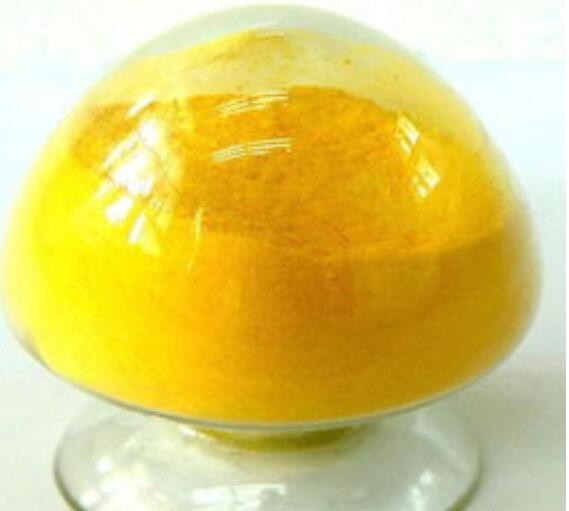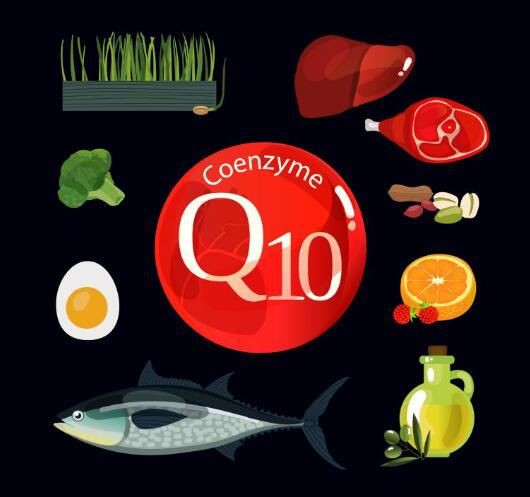What is Coenzyme Q10?
Coenzyme Q10, or CoQ10, is a naturally occurring chemical that exists in almost every cell of the human body. CoQ10 carries out several vital roles, including promoting energy production and neutralizing harmful particles called free radicals.
Coenzyme Q10 is also named Ubiquinone,chemical name is :2,3-Dimethoxy-5-Methyl-6-Decaprenylbenzoquinone,molecular weight is :862,commercial name is :Ubidecarenone,Neuquinon.
It is a fatsoluble organic quinones compound widely existing in the living body. It has very important physiological and pharmacological actions in human bodies, therefore, it is widely used inphysiology, pharmacy, cosmetics and health protection. It (COQ10) is a molecule produced in the body. It aids mitochondria during energy production and is a part of the endogenous system. It is similar to other pseudovitamin compounds because it is vital for survival, but does not necessarily need to be taken as a supplement. However, there is a potential for deficiency due to suffering a heart attack, taking statins, various disease states, and aging.
Coenzyme Q10 (CoQ10) is a nutrient that occurs naturally in the body. CoQ10 is also in many foods we eat. CoQ10 acts as an , which protects cells from damage and plays an important part in the metabolism.

Basic Information:
Product name | Coenzyme Q10 |
Place of Origin | China |
Extraction Type | Solvent Extraction |
Cas No | 303-98-0 |
Test Method | HPLC |
Application | Dietary Supplement |

Coenzyme Q10 Benefits:
1) Coenzyme Q10 Deficiency
In rare cases, coenzyme Q10 deficiency can cause weakness, fatigue, and seizures.
Oral coenzyme Q10 (800 mg daily) seems to improve the symptoms of deficiency in adults. The recommended dosage in children is 30 mg/kg daily in three divided doses.
Get the Regimen of A Top Biohacker Preparing His Body to Fight Coronavirus
Joe Cohen is well-known for his work as a successful entrepreneur in the health field after he overcame his many health issues using a personalized regimen. Find out exactly which supplements he takes and what lifestyle changes Joe has made to maintain optimal health and prepare his body to fight off infections.
2) Mitochondrial Diseases
Mitochondrial diseases are a group of disorders caused by mitochondria that don’t function correctly. Coenzyme Q10 improves symptoms of mitochondrial disorders including poor nerve function, muscular weakness, tremor, inability to exercise, cramps, and muscle stiffness.
3) Heart Disease
Hypertrophic cardiomyopathy is a type of heart disease in which the walls of the heart become abnormally thick, causing an irregular heartbeat and making it harder for the heart to pump blood.
Taking 200 mg/day CoQ10 for improved heart function, irregular heartbeat, and quality of life and reduced the heart wall thickness in 87 people with HCM. In another study of 7 HCM patients, 200 mg/day CoQ10 was able to reduce heart wall thickness by 26%.
4) Blood Pressure
Multiple studies of over 280 total people with high blood pressure have found that supplementing with CoQ10 (100 – 225 mg/day) reduces blood pressure. Reductions in systolic pressure ranged from 8% to 11% and diastolic pressure ranged from 9% to 12%.In people with slightly high blood pressure, studies have found that CoQ10 reduces systolic pressure 3 – 4% and diastolic 0.4 – 2%.
5) Inflammation
CoQ10 reduces levels of inflammatory compounds including CRP and TNF-α. These inflammatory compounds are linked to heart disease and diabetes.In a study of 60 diabetics, Coenzyme Q10 reduced levels of the pro-inflammatory cytokine IL-6.A review of 9 studies and 428 people found that CoQ10 reduced TNF-α, but had no effect on CRP or IL-6 [41].However, another review of 17 studies and 811 people found that CoQ10 reduced CRP, IL-6, and TNF-α.CoQ10 may reduce inflammation by reducing the production of NF-κB. NF-κB is a protein that controls genes responsible for producing inflammatory compounds.
6) Blood Sugar Levels
A meta-analysis of 18 studies and over 700 people found that CoQ10 reduced blood sugar in those with high and normal levels with doses below 200 mg/day and in studies no longer than 12 weeks.
An analysis of 14 studies and 693 overweight and obese people with diabetes found that CoQ10 reduced blood sugar (fasting and HbA1c) and insulin levels in doses below 200 mg/day.
7) Diabetes Complications
High blood sugar levels in diabetes damage the nerves, causing pain, tingling, and numbness, known as diabetic neuropathy. In 24 diabetics suffering from neuropathy, 400 mg/day CoQ10 improved nerve function and symptoms of nerve damage.CoQ10 prevented nerve pain and reduced inflammation in diabetic mice.
8) Infertility
Men
Male fertility is determined by the number (count) and quality (motility and morphology) of the sperm. Sperm cells rely on CoQ10 for the energy needed to move and for its protection.
Women
Poor ovarian reserve (POR) is a term used to describe a reduction in quantity and quality of immature eggs in women of reproductive age. It can reduce the success of in vitro fertilization (IVF).CoQ10 increased the IVF rate and the number of high-quality embryos in women with this condition, as well as pregnancy and live birth rates.
9) Migraines
CoQ10 levels are often lower in people who experience migraines.In multiple studies, CoQ10 (100 – 300 mg/day) reduced the duration, frequency, and severity of migraines. In one study, 150 mg/day reduced the number of migraines by over 50% after 3 months.
10) Fibromyalgia
Fibromyalgia is characterized by altered CoQ10 distribution in the body and increased oxidative stress. CoQ10 levels may be high in the blood, but low in immune cells. Supplementation can increase CoQ10 levels in immune cells, which protects them and lowers oxidative stress.
In multiple studies, CoQ10 supplementation (100 – 300 mg/day) improved symptoms of fatigue, pain, headache, and depression. Supplementation also reduced inflammation and improved mitochondrial function.
11) Muscle Wasting
Muscular dystrophies are a group of genetic disorders that cause muscle wasting, weakness, difficulty breathing, and poor balance.In two studies of 27 people with muscular dystrophies, 100 mg CoQ10 daily improved their ability to walk and exercise and reduced their fatigue.
12) Multiple Sclerosis
In two 12-week studies of 93 people multiple sclerosis, 500 mg/day CoQ10 improved symptoms of fatigue and depression and reduced inflammation.
13) Chemotherapy Side Effects
A class of chemotherapy drugs called anthracyclines (doxorubicin, daunorubicin, and aclarubicin) cause damage to the mitochondria of the heart. CoQ10 protects mitochondria in the heart.A review of 6 studies found that CoQ10 protected against damage to the heart and liver during chemotherapy.
In a 5-year study of 81 people who had melanoma surgery, those who took CoQ10 (400 mg/day) in addition to the drug were 13 times less likely to have the cancer spread compared to drugs alone. The CoQ10 group also had better mood and energy levels.
In rats, CoQ10 protects kidneys from damage due to doxorubicin without interfering with its effectiveness. Mice given CoQ10 lived longer after being exposed to doxorubicin.
14) Peyronie’s Disease
Peyronie’s disease (PD) is a disease in which scar tissue builds up in the penis causing curvature, erectile dysfunction, and painful intercourse.
In a clinical trial of 186 people with this disease, 300 mg/day CoQ10 reduced scar tissue, the curvature of the penis, and improved erectile function.
Insufficient Evidence:
No valid clinical evidence supports the use of CoQ10 for any of the conditions in this section. Below is a summary of up-to-date animal studies, cell-based research, or low-quality clinical trials which should spark further investigation. However, you shouldn’t interpret them as supportive of any health benefit.
15) Side Effects of Statin Drugs
Statins block the production of CoQ10 and decrease its levels. One of the most common side effects of statins is damage to the muscles, causing weakness and pain (in 10 – 15% of people). These side effects may be due to low CoQ10 levels and often cause people to quit taking statins.
In a study of 50 people taking statins, 100 mg/day CoQ10 reduced muscle pain and improved their ability to accomplish daily activities.
In 20 athletes taking statins, 200 mg/day improved muscle strength.
Statins can also interfere with the ability of the heart to pump blood. CoQ10 supplementation is able to reverse this and improve heart function in people taking statins.
In rats given statins, CoQ10 protects the muscles and liver from damage and improves mitochondrial health.
However, in a meta-analysis of six clinical trials, coenzyme Q10 didn’t provide protection against the side effects of statins on muscles.
More studies are needed to shed light on these conflicting results.
16) Depression
One study in 18 people with depression found that 400 – 800 mg/day CoQ10 for 4 weeks reduced the severity of the depression and improved symptoms of sadness, fatigue, and difficulty concentrating.
17) Parkinson’s Disease
In Parkinson’s disease, dopamine neurons get destroyed. Dopamine is important for movement, learning, and feelings of reward. CoQ10 levels are lower in the mitochondria of people with early Parkinson’s disease.
A trial of 80 people with early Parkinson’s disease found that taking either 300 mg, 600 mg, or 1,200 mg daily for 16 months slowed the decline in mental and physical function. The greatest benefit was seen in the group taking 1,200 mg.
But in a small trial of 17 people with Parkinson’s, 3,000 mg Coq10 daily for 2 months did not improve mental or physical function compared to placebo.
In a mouse model of Parkinson’s disease, CoQ10 protected neurons dopamine-related neurons.
In rats with Parkinson’s, CoQ10 in combination with creatine protected the brain and prevented the loss of dopamine that occurs with the disease.
Higher doses (> 1,200 mg) of CoQ10 for longer periods may help people with Parkinson’s disease, but more research is needed.
18) Movement Disorders
Friedreich’s ataxia and familial cerebellar ataxia (FCA) are hereditary diseases that result in problems with muscle coordination, movement, speech, and balance. A study of 97 people found that those with Friedreich’s ataxia had 33% lower CoQ10 levels.
In a 2-year study of 50 people with Friedreich’s ataxia, CoQ10 (600 mg/day) and vitamin E (2,100 IU/day) improved walking ability, coordination, and speech.
A 4-year study of 10 people with Friedreich’s ataxia found that 400 mg/day Coq10 in combination with vitamin E (2,100 IU) improved walking ability and slowed the progression of the disease in 7 people.
Six case reports of people with FCA found that doses between 300 mg/day and 3,000 mg/day for one year improved strength and well-being and muscle coordination, and reduced seizure frequency.
19) Blood Lipids
CoQ10 reduced total cholesterol and increased HDL cholesterol in people with heart disease, according to a review of 8 studies including over 500 people. However, it had no effect on LDL cholesterol or triglyceride levels.
On the other hand, according to another review of 21 studies and 1k people, CoQ10 does reduce triglyceride levels in people with metabolic disorders but has no effect on total, LDL, or HDL cholesterol levels.
CoQ10 may improve cholesterol levels in people with heart disease and triglyceride levels in people with metabolic disorders. More research is needed.
20) Gum Inflammation
CoQ10 reduced gum inflammation in 30 people with gum disease.When applied directly to the gums, CoQ10 improved gum health and reduced bleeding.
21) Dry Mouth
Dry mouth is thought to be caused in part by reduced ATP saliva production. Supplementing with CoQ10 increased saliva production in a study of 66 people with dry mouth.
22) Lung Diseases
People with chronic obstructive pulmonary disease (COPD) have difficulty breathing and lower CoQ10 levels than healthy people. In an 8-week study, CoQ10 increased oxygen in the blood, decreased heart rate during exercise, and improved exercise performance in 21 people with COPD.
In 41 people with bronchial asthma, a combination of CoQ10, vitamin E, and vitamin C reduced the dosage of drugs (corticosteroids) needed.
23) Skin Protection
UV radiation from the sun causes free radical damage in the skin, leading to wrinkles. CoQ10 applied to skin decreases free radicals and inflammation and increases levels. It also reduces the depth of wrinkles and decreases oxidative stress and DNA damage due to UV radiation.
24) Aging
A trial of 443 elderly people, selenium (200 mcg) and CoQ10 (200 mg/day) over a 4-year period improved vitality, physical performance, and quality of life.There’s not enough evidence to say if CoQ10 can increase lifespan, although scientists are investigating the possibility.
One study in humans found that levels in multiple organs including the heart, liver, and kidneys all peaked before the age of 20 and decreased with age.In a study of adults aged 18 to 82 years, levels were lowest in the older adults. Another study found that young children had lower CoQ10 levels than adults aged 28 – 78 years.
25) Liver Disease
Nonalcoholic fatty liver disease (NAFLD) is a liver disorder that involves chronic inflammation. Taking 100 mg decreased liver enzymes (AST and GGT) and markers of inflammation in a 12-week study of 41 people with this disorder.
In rats exposed to toxins, CoQ10 reduces liver enzymes, inflammation, and damage and increases levels in the liver.
Animal and Cellular Research (Lacking Evidence)
No clinical evidence supports the use of CoQ10 for any of the conditions listed in this section. Below is a summary of the existing animal and cell-based research, which should guide further investigational efforts. However, the studies listed below should not be interpreted as supportive of any health benefit.
26) Gut Health
In rats, CoQ10 prevented damage to the gut from alcohol.
Nonsteroidal drugs (NSAIDs) such as ibuprofen can cause damage to the gut. CoQ10 reduced gut damage by increased levels and boosting levels of gut-protective prostaglandin E2.
In a rat model of ulcerative colitis (UC), CoQ10 improved gut health by reducing oxidative stress and inflammation.
27) Bone Loss (Osteoporosis)
Osteoporosis is a disease in which bones become weak and brittle due to bone loss. CoQ10 reduces the breakdown of bone and increases new bone formation in rats with osteoporosis.

Application:
1. Help protect the heart helps to provide sufficient oxygen to the heart muscle and prevent sudden heart disease. It plays a key role in improving myocardial hypoxia.
2. Protect the skin Long-term use of Coenzyme Q10 can effectively prevent skin aging and reduce facial wrinkles.
3. keeps cells in a good and healthy state, so the body is full of energy, energy and brainpower. The biological activity of Coenzyme Q10 mainly comes from the redox properties of its quinone ring and the physicochemical properties of its side chains. It is a natural and cell metabolism initiator produced by the cell itself. It has the function of protecting and restoring the integrity of the biofilm structure and stabilizing the membrane potential. It is a non-specific immune enhancer of the body, so it shows excellent effect.
4. and research shows that it has effect and has certain clinical effect on advanced metastatic cancer.
Where to buy Coenzyme Q10?
Just send email to [email protected], or submit your requirement in bottom form, we are of service at any time!
Hot Tags: coenzyme q10, suppliers, manufacturers, factory, wholesale, buy, price, quotation
Curated Products
Provide Curated Products for all product over $100
Handmade
We ensure the product quality that is our main goal
Natural Food
Return product within 3 days for any product you buy
Free home delivery
We ensure the product quality that you can trust easily






